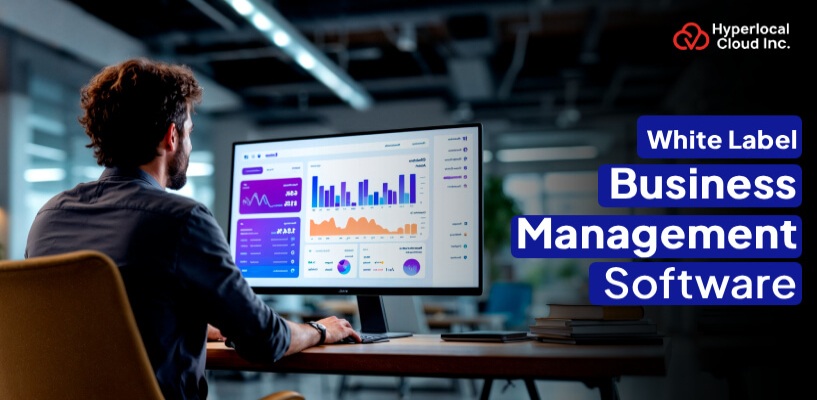White Label Business Management Software Solution

Nowadays, digital dependency is at its peak; businesses, whether small, medium, or large, need gear that helps them manage daily operations without strain. This is where business management software steps in as a true game-changer. It allows businesses to automate obligations, streamline workflows, and gain higher control over each department from finance to accounting, human resources, and beyond.
Over the past few years, the demand and popularity for such software solutions have grown notably. The reason is simple: businesses want to do more with much less effort. Manual management of business techniques regularly leads to delays, human errors, and suboptimal decision-making. Thus, business management software programs bring the entirety beneath one roof, allowing managers to handle, plan, and make wide decisions.
What Is Business Management Software?
Business management software is an all-in-one digital platform designed to handle various components of an employer’s operations. It connects numerous departments, which include finance, income, HR, project management, and customer service, into a single unit. Instead of using more than one tool to handle different activities, this software program combines all those functions into one.
Boost Your Service Offering With One Click
How Does Business Management Software Work?
The working model of a business management software typically consists of several essential steps that make it easy to use. Here are all the steps mentioned in detail.
1. Data Collection
The software program collects facts from numerous departments, together with sales figures, client records, economic transactions, and other relevant records.
2. Centralized Database
All these facts are saved in a single stable database. This permits personnel to get access to real-time facts without relying on separate files or systems.
3. Task Automation
From scheduling conferences, sending reminders, and updating inventory levels, the software can automatically perform several tasks with ease.
4. Analytics and Reporting
Built-in analytics gear reworks uncooked records into significant insights. Managers can view specified reviews, analyze developments, and make knowledgeable selections.
5. User Access Control
Every consumer has a selected function or degree of get right of entry to. This ensures data security and helps preserve the right workflows.
What Are the Comprehensive Types of Business Management Software?
There are several essential types of business management software, of which some of the most compelling ones are discussed below.
1. Enterprise Resource Planning Software
ERP integrates core business features, including finance, HR, supply chain control, and stock control, right into a single gadget. It affords a holistic view of business enterprise operations.
2. Customer Relationship Management Software
CRM enables control of interactions with customers. It tracks income, manages leads, and stores customer data to enhance relationships and drive retention.
3. Project Management Software
This type of software focuses on challenge allocation, progress monitoring, and collaboration among group participants. It guarantees that projects are finished on time and within the price range.
4. Accounting Software
The online accounting software handles financial transactions, bookkeeping, payroll, and invoicing, ensuring accuracy within the corporation’s financial records.
5. Human Resource Management Software
Human resource software manages employee information, attendance, recruitment, and overall performance evaluation.
6. Inventory Management Software
It allows tracking stock levels, manipulating providers, and saves you from shortages or overstocking.
7. Collaboration and Communication Software
These tools permit crew contributors to attach and collaborate without difficulty through chats, video calls, or shared documents.
What Are the Exclusive Benefits of Business Management Software?
Businesses or entrepreneurs who are ready to start their business journey with business management software get a lot of benefits. A list of lucrative benefits is mentioned below.
1. Improved Efficiency
Automation reduces manual effort and saves time. Employees can do the entire extra work with much less pressure.
2. Decision-Making Power
Real-time reports and analytics allow managers to make knowledgeable, data-driven choices.
3. Enhanced Collaboration
With the software, businesses can receive updates, documents, and feedback immediately, regardless of their location.
4. Cost Savings
By lowering human mistakes and manual workloads, entrepreneurs save a lot of money because they don’t need to run any external code.
5. Data Security
Business management software solution for small businesses effortlessly store data in order to protect it from unauthorized get right of entry to or loss.
6. Customer Satisfaction
With streamlined operations and fast response times, agencies can serve clients more efficiently.
7. Scalability
As your business grows, the software will also grow and control your business to make it scalable and efficient.
Why Invest in a White Label Solution to Build a Business Management Software?
Investing in a white label solution for the development of a mobile software will be cost-effective, reliable, and scalable. Here you will get a brief explanation.
1. Faster Market Entry
You can start selling your software program nearly right now since the base product is already constructed.
2. Cost-Effective
It saves you from hiring builders or purchasing servers. You simply pay for personalization and branding.
3. Focus on Branding
By making an investment in a white label solution, organizations can sell the software as their own, giving their brand more credibility.
4. Scalability and Flexibility
White-label platforms are customizable. You can upload new capabilities as your clients’ desires evolve.
5. Technical Support Included
Most white label solution providers offer ongoing updates, which ensure that the software is free from bugs and glitches.
Book a Free Demo of Our White Label Platform
The Features and Functionalities of Business Management Software
A business management software integrated with numerous features and functionalities. A list of those key features is precisely mentioned in the table.
| Key Features and Functionality | Description |
| Dashboard Overview | Displays key metrics, consisting of income, sales, and venture development, in a single region. |
| Task and Project Management | Allows users to assign tasks, set deadlines, and tune development. |
| CRM Integration | Helps manage consumer relationships, leads, and follow-ups. |
| Accounting Tools | Handles invoicing, payroll, charges, and monetary reports. |
| Inventory Tracking | Monitors inventory levels, manages buy orders, and forecasts destiny demand. |
| Employee Management | Records attendance, manages schedules, and tracks performance. |
| Reporting and Analytics | Provides insights into operations to perceive strengths and weaknesses. |
| Multi-User Access and Permissions | Ensures that every team member can get right of entry to what they need, primarily based on their function. |
| Mobile Compatibility | Allows users to control enterprise operations from mobile gadgets on the move. |
| Data Backup and Security | Protects sensitive business information via encryption and regular backups. |
How AI Integration Becomes Game-Changing for Business Management Software
It is very obvious that the integration of artificial intelligence in software development will provide top-notch results. This results in AI-driven technologies becoming a game-changing aspect in business management software development.
1. Turning Data Into Actionable Insights
This data analysis allows managers to make informed selections based on statistics in preference to guesswork.
2. Efficiently handle Tasks
By automating such sports, AI permits personnel to focus on more meaningful tasks, including building relationships, planning techniques, and innovating.
3. Enhancing Decision-Making with Predictive Analytics
This predictive energy offers organizations fantastic growth. Managers can prepare earlier, mitigate risks, and capitalize on opportunities fast. In brief, AI turns commercial enterprise control software programs from a reporting tool into a forward-thinking partner.
4. Improving Customer Experience Through Personalization
AI can examine patron alternatives, purchase history, and comments to create personalized recommendations. For instance, it can propose products that a patron is likely to buy, send tailored emails, or provide special gifts based on personal preferences and conduct.
5. Smarter Human Resource Management
In HR departments, AI integration allows for streamlined recruitment, worker assessment, and performance control.
6. Advanced Security
Cybersecurity is one of the most important worries for contemporary organizations. AI integration strengthens enterprise control software by providing proactive security functions.
7. Streamlined Supply Chain and Inventory Management
AI integration is likewise reworking the manner in which agencies manage inventory and supply chain operations. By reading buying styles and income statistics, AI can forecast demand and robotically adjust stock levels.
The Process to Develop a Business Management Software
The development of the business management software is done with the help of several steps that are briefly defined below. Let’s start:
1. Market Research
The first step in growing a commercial enterprise control software program is undertaking thorough market research. This entails studying the contemporary market trends, identifying current answers, and gathering information on the demanding situations faced by corporations. The purpose is to pick out gaps within the marketplace and determine the specific fee your software program can offer.
2. Design
Once the requirements are clear, the next step is to design and wireframe the software. This degree focuses on making plans that the person revels in and a visible interface. Designers create wireframes and prototypes to demonstrate how customers will navigate through the machine and engage with different features.
3. Development
The development part is crucial, that’s why it needs to be done with high expertise. So basically, the development part is successfully done from scratch or with the help of white label solutions. Both methods are different from each other and come with several advantages and disadvantages. So businesses are required to make a wide decision by analyzing their business requirements, so that they will get lucrative results.
4. Testing
Testing guarantees that the application capabilities are easily accessible throughout numerous gadgets, browsers, and operating systems. Various forms of checks are performed, together with unit tests, integration assessments, gadget tests, and consumer recognition assessments.
5. Deployment
Deployment can be executed in stages, beginning with a beta release for a limited number of customers to accumulate feedback, followed by a full-scale release. Proper deployment ensures a smooth transition from development to real international usage.
6. Maintenance
The very last degree is protection and updates, which recognize the importance of making sure the software program stays steady and up to date. Continuous monitoring enables picking out bugs, overall performance troubles, or user-reported problems.
To Whom Does Business Management Software Apply?
White label business management is no longer limited to specific industries. Now, with technological advancement, the software has become versatile and can be used by several industries. Just have a look to understand.
| Key Users | Description |
| Small and Medium Enterprises (SMEs) | They utilize it to streamline everyday operations without the need for big groups. |
| Large Corporations | They depend on it to coordinate departments, control facts, and enhance efficiency. |
| Startups | Startups put it to use to organize their operations from the outset, setting up a strong foundation for growth. |
| Agencies and Service Providers | Marketing, IT, and monetary agencies use it to music projects, sources, and clients. |
| Educational Institutions and Nonprofits | They put it to use for administrative duties, staff management, and conversation functions. |
Start Building Your Own Software Empire
A Revenue Generation Model of a Business Management Software
Business management software for small businesses can generate revenue in several ways. With the help of the information below, you will get to know how.
1. Subscription-Based Model
Users pay a monthly or yearly rate to apply the software. This presents consistent ordinary earnings.
2. Freemium Model
The basic version is free; however, advanced functions are available via paid upgrades. Thus, the freemium model becomes an effective way to generate an ROI.
3. Pay-Per-User or Pay-Per-Feature
Clients are charged based on the number of users or unique capabilities they use. This is an additional way to generate a good income from the software.
4. White-Label Reselling
Businesses can purchase a white-label model and sell it under their logo, generating profit from resales.
5. Customization and Integration Services
Additional income may be generated by way of presenting personalized features or providing integration support to clients.
Conclusion
Hyperlocal Cloud has proven years of expertise in creating business management software for entrepreneurs. Our team makes sure to develop top-notch software that saves your time, as well as money. Whether you’re a small enterprise owner or a part of a large corporation, investing in one of these software can make a massive difference in the way you control and develop your operations. So make sure to get in touch with us and start your business journey today!





